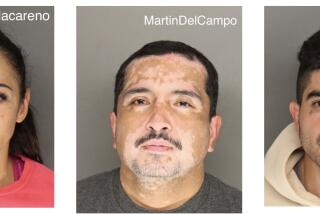3 Charged With Hate Crimes in 1997 Killing of Black Man
Prosecutors charged two men and a woman Tuesday with killing an African American man and burying his body in a shallow grave in Palmdale so that the woman could then get a tattoo symbolic of a white supremacist attack.
The skeletal remains of Howard Garfield McClendon, 32, were found on the outskirts of Palmdale on Oct. 22, 1997. His death remained a mystery until last year, when investigators received information that led them to the suspects, said Lt. Joe Hartshorne of the Los Angeles County sheriff’s homicide division.
According to documents filed by the county district attorney’s office, Kelly Jean Sorrell, 26; Richard Phillip Ritchie, 28; and a defendant identified only as Justin R., then 17, drove around Palmdale on July 18 of that year “to search for an African American person to murder.”
The goal was for Sorrell to “earn the right to obtain lightning bolt tattoos,” prosecutors allege. In racist circles, such markings are often meant to communicate that the wearer has carried out a violent assault.
The suspects lured McClendon into Sorrel’s car, drove him down a secluded dirt road and killed him with a knife and a baseball bat, prosecutors allege.
Hartshorne said that none of the suspects was believed to be allied with white power groups at the time. “It was just a horrendous plan, formulated by these three, to murder a black man,” he said.
Sorrell was arrested last weekend. Ritchie is in state prison on other charges, and the third defendant, whose full name was not released because he was a juvenile at the time, is in county jail on an unrelated matter.
Because of the special allegation that the attack was a hate crime, Sorrell and Ritchie could face the death penalty. The third defendant faces a maximum sentence of life in prison.
All are also charged with conspiracy to commit murder.
Sheriff Lee Baca praised detectives Tuesday for cracking the long-dormant case. He also reiterated a vow to prosecute racist attacks.
“A hate crime of this magnitude is not only unconscionable, it destroys the fabric and fiber of the American way of life,” he said.
More to Read
Sign up for Essential California
The most important California stories and recommendations in your inbox every morning.
You may occasionally receive promotional content from the Los Angeles Times.










